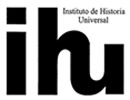Código de ética
Los conceptos vertidos por los/las autores/as son de su exclusiva responsabilidad y no representan necesariamente las opiniones del Comité Editorial, Académico, Consultores, Revisores, de la Revista de Historia Universal.
La Revista de Historia Universal adhiere al código basado en los Principios internacionales de transparencia y buenas prácticas en publicaciones académicas del Comité de Ética de Publicaciones COPE -Committee on Publication Ethics: http://publicationethics.org/-. Está dirigido a editores, revisores y autores intervinientes en la publicación científica.
Los editores se comprometen a respetar las siguientes normas:
– Decisión de publicación: Selección de los revisores más cualificados científicamente y especialistas para emitir una apreciación crítica y experta del trabajo, con los menores sesgos posibles.
– Honestidad: Evaluación de los artículos enviados sobre la base del mérito científico de los contenidos, en consonancia con la política editorial de la revista
– Confidencialidad: No divulgación de la información relativa a los artículos enviados para su publicación a otras personas que no sean autores, revisores y otros editores. El anonimato preserva la integridad intelectual de todo el proceso.
– Conflicto de intereses y divulgación: No utilización de contenidos de los artículos enviados para su publicación sin el consentimiento por escrito del autor.
– Tiempos del proceso editorial: Comunicación en tiempo de la recepción, la evaluación, la decisión y la estimación, corrección o desestimación de los trabajos recibidos en un tiempo que en global no supere los 180 días, contados desde el momento que se notifica al autor sobre la recepción del envío.
Los Revisores se comprometen a las siguientes normas:
- Contribución a la decisión editorial: Evaluación de los trabajos recibidos de manera crítica, constructiva y sin sesgos, con el fin de garantizar la calidad científica y literaria en su área de conocimientos.
– Gestión del tiempo: Evaluación de los trabajos en el tiempo menor posible para respetar los plazos de entrega, dado que la Revista de Historia Universal promueve la optimización de la gestión editorial.
– Objetividad: Evaluación del texto bajo el sistema de doble pares ciego, de forma completa, clara y concisa de acuerdo con la grilla provista por la Revista de Historia Universal, sin mediar juicios personales sobre el/los autor/es. Las valoraciones estarán justificadas en un informe lo más exhaustivo posible de modo que permita al/los autor/es comprender claramente las modificaciones o correcciones sugeridas, o, en caso de que el trabajo sea rechazado, comprender los motivos de dicha decisión. Asimismo, en caso de existir cualquier conflicto de interés, se deberá rechazar la revisión del trabajo.
– Confidencialidad: No discusión el contenido de los trabajos con otras personas sin el consentimiento expreso de los autores ni de los editores.
– Visualización de texto o referencias bibliográficas: Indicación precisa de las referencias bibliográficas de obras fundamentales no incluidas por el autor e informar a los editores de cualquier similitud o solapamientos del manuscrito con otros trabajos publicados.
– Conflicto de intereses y divulgación: No utilizar el contenido de los trabajos para propósitos personales y rechazar revisar un manuscrito si existen conflictos de interés.
Los autores se comprometen a respetar las siguientes normas:
– Originalidad y plagio: Envío de un texto su publicación inédito y original, sin partes de otro/s autor/es o de otros fragmentos de trabajos ya publicados por el/los autor/es. Confirmación de la veracidad de los datos y de los resultados expuestos en el trabajo, sin distorsión ni manipulación de los datos empíricos o de las fuentes para corroborar las hipótesis o conjeturas.
– Compromiso de exclusividad: Envío exclusivo del trabajo a la Revista de Historia Universal; es decir, el escrito no puede ser presentado simultáneamente a otra revista para su selección. Asimismo no puede contener, aunque sea de manera parcial, resultados ya publicados en otros artículos. Esto es una forma de autoplagio inadmisible.
– Lista de fuentes: Indicación correcta de las fuentes y los aportes mencionados en el artículo.
– Autoría: Jerarquización de los autores en función de la responsabilidad e implicación en su elaboración e inclusión de todas las personas que hayan realizado aportes significativos de carácter científico e intelectual en el desarrollo de la investigación y en la redacción del artículo.
– Conflicto de intereses y divulgación: Obligación de declarar explícitamente que no hay conflictos de intereses que puedan haber influido en los resultados obtenidos o las interpretaciones propuestas. También, indicar cualquier financiación de agencias y/o de proyectos de los que surge el artículo de la investigación.
– Errores en los artículos publicados: Comunicación al equipo editorial cualquier error o inexactitud relevante para que este pueda realizar las correcciones necesarias
– Responsabilidad: Responsabilidad de lo que lo escrito está respaldado por un análisis profundo de la literatura científica más actual y relevante de la materia, y su discusión. Compromiso de responder a las eventuales sugerencias de editores y evaluadores en tiempo y forma.



















